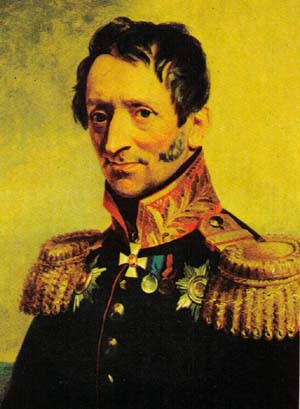The directory «Plots of stamps in the catalogue»
Sivers (Сиверс) Karl Karlovich (Karl Gustav)
(1772—1856)

Karl Karlovich Sivers received excellent military edutcation, graduating from Artillery Engineer Corps and enlisted in the Bombardier Regiment in 1789. Next year, he transferred to the 2nd Cadet Corps and then to the 2nd Artillery Bombardier Regiment in which he took part in the Polish Campaign of 1792. He accompanied General Anchef Krechetnikov, was promoted to lieutenant of artillery and served at the Russian diplomatic mission. In 1795 he transferred to the Rostov Cuirassier Regiment with the rank of premier major. In 1798, he was promoted to lieutenant colonel and awarded the Order of St. Anna (3rd Class) and then promoted to colonel in 1799. However, in the spring of the same year, he was dismissed from the service for unknown reasons. Sivers returned to the army only in December 1800 and served in Voinov's Cuirassier Regiment. On 28 May 1803, he became a major general and appointed chef of Novorossiiski Dragoon Regiment and retained this position until 13 October 1814. Sivers participated in the 1805 Campaign, serving in Lieutenant General Essen's corps and then was transferred to the Danube Theater in 1806. He participated in the capture of Khotin. In 1807, Sivers returned to European front and fought the French at Troschin, Stanislavov, Drengev, and on the Omulev, Ruzhan and Narew Rivers. For his actions, he was awarded The Order of St. Anna (1st Class) in January 1808. The following year, Sivers participated in the campaign against Austria and commanded the advance guard at Pnev, on the Son River and distinguished himself by occupying Krakow in June. On 16 February 1810, Sivers became commander of the brigade of the 4th Cavalry Division, but kept his position of chef of Novorossiiski Dragoon Regiment. In 1812, he was given command of the 4th Cavalry Division and attached to the 2nd Western Army of General Peter Bagration. In July 1812, he constructed bridges at Nikolaev for the 2nd Army and covered its movement to Bobruisk. Sivers distinguished himself during the forced march to Moghilev, when his forces made over 80 miles in 36 hours. On 23 July he participated in the battle at Saltanovka (Moghilev). He then followed Bagration to Smolensk, where he fought the French on 16 August. He assumed command of the 27th Infantry Division and successfully defended his positions. On 17 August, he fought under Dokhturov and joined the 2nd Army during its retreat to Dorogobouzh, where he commanded the observation corps. He then was given command of the rear guard of the 2nd Army and made a fighting retreat and fought at Gzhatsk, Popovka, and Kolokoletsk. He fought at Borodino on 7 September, where he led a desperate counterattack of 2 cuirassier and one dragoon regiments. After the battle, he took part in actions at Mozhaisk, Tatarin, and Chirikov. For his actions, Sivers received The Order of St. George (3rd Class) on 1 November 1812 and on 15 December 1812 was appointed to command the cavalry of Wittgenstein's Corps. On 30 December 1812, he crossed the Nieman and occupied Konigsberg. On 8 February 1813, he captured a fortress of Pillau with some 2,000 men strong French garrison. On 20 February, he was appointed commandant of Konigsberg, then on 14 April, he became military governor of Eastern Prussia and Konigsberg. On 1 November 1813 he was promoted to lieutenant general and on 13 September 1814 was transferred from the artillery service to cavalry. Sivers continued his service as military governor for next two years and was awarded Prussian The Order of Red Eagle (1st Class) for his service. In March 1829, he was appointed to the commission of military tribunal, where he served until 1830. In 1833, he was appointed to the Senate and in January 1837 he received civil rank of secret state councilor. In January 1840 he was awarded The Order of White Eagle. In 1841-1848, Sivers served in various departments of the State Senate. He resigned in June 1853 and spent rest of his life in his estate.
USSR, 1974.02.01,  Monuments in Borodino
Monuments in Borodino